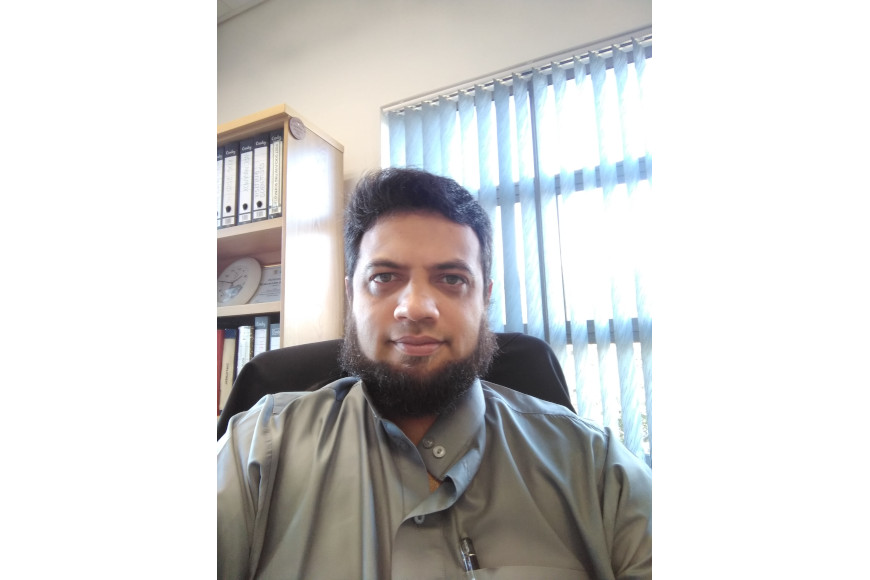Dr Ismail Rawat is an esteemed researcher who is based at the Durban University of Technology’s (DUT’s) Institute for Water and Wastewater Technology. The dynamic academic was recently awarded the prestigious NRF-Y1 rating, which recognises young researchers with outstanding potential to establish themselves as leading experts within the next five years (2024–2029).
“I am pleased to have received a Y1 rating. The reviewer feedback from NRF have been overwhelmingly positive,” he shared euphorically.
An excerpt from the NRF feedback for Dr Rawat says: “The overriding majority of your reviewers think you capable of establishing yourself as a researcher of considerable international standing on the basis of the quality and impact of your research outputs.”
Dr Rawat obtained his PhD in 2021 and has contributed 55 DHET accredited journal articles in high impact factor journals, seven book chapters and 26 peer reviewed conference proceedings. He has more than 7300 citations with and H-Index of 41 (google scholar). Dr Rawat has an extensive supervision record of BTech/Honours and Inservice trainees. He currently supervises two doctoral and four master’s students and mentored several NRF interns.
Further to his sterling achievements, Dr Rawat is a recognised reviewer for several Elsevier journals and has acted as reviewer for a national and an international funding agencies including National Research Foundation (SA), Water Research Commission (SA), CIVIS3i (France), Dutch Research Council and NSC (Norway).
Dr Rawat has served as assistant project leader on a TIA funded project utilising wastewater for the production of algal biofuels in a demonstration scale (300m3) raceway pond. The project was co-funded by the Japan International Cooperation Agency and the Department of Science and Innovation, South Africa and the Technology Innovation Agency. He served as primary researcher on a Water Research Commission funded project using in the beneficiation of wastewater to the production of algal biomass for industrial application in biofuels, feed and biofertiliser. He further played a senior role in KZN EDTEA funded project on Enhancing Aquaculture feed whereby we are developing and testing a feed supplement to increase the size and potentially nutritional content of Tilapia. These roles included research methodology development, proposal writing, progress, technical and financial reporting and engaging with funders on an ongoing basis.
Elaborating on the specific focus of his current research, Dr Rawat emphasised that his research focus is on algal biotechnology integrated with wastewater treatment and beneficiation. His interests draw strongly on the biorefinery concept incorporating principles of renewable and sustainable resources.
“The research looks on the industrial application of algal biomass for the production of energy, other valuable bioproducts and remediation of waste effluents. Current student projects focus on remediation of sugar milling effluent, bioremedition of antibiotics from municipal wastewater, improving the survival rates of fish larvae at Ushaka Seaworld by direct and indirect application of algae as a feed source, production of natural sunscreens, bioplastics for food packaging and production of Omega 3 fatty acids as dietary supplements,” he explained.
He highlighted that his innovative research aligns strongly with the sustainability and society perspectives from DUT’sENVISION2030 strategy.
“Algae are a sustainable, renewable resource which has been historically under-utilised in biotechnology. My research focus looks at algal systems and products as sustainable alternatives to problems such as environmental protection (Bioremediation), limited resources (Omega 3 fatty acids) and natural alternatives to synthetic materials such as plastics and sunscreens which are persistent within the environment,” he added.
Delving further into his research, Dr Rawat said that a large majority of the projects that he has applied in research contributes to solving real-world problems. “We have aligned with a local sugar producer to remediate wastewater and enhance their existing treatment system. We work with Ushaka Marine world to improve their fish larvae survival rates by increasing the nutritional value of their green water. Omega 3 fatty acids are an essential dietary supplement, but has and will becoming limiting due to overfishing and ocean pollution,” he indicated.
Sharing more on his academic research passion, Dr Rawat explained that his earlier research was on the production of biodiesel from algae due to its potential as renewable, sustainable, environmentally friendly alternative to fossil diesel. “We have shown the technical feasibility of the research, however economic considerations limit application currently,” he expressed.
In terms of his research, he believes that it is contributing to the broader academic community and influencing future research directions in his field. Dr Rawat’s research on wastewater utilisation for algal cultivation has been cited extensively with early two review articles being cited over 1400 and 1100 times respectively.
“Publications of high quality research in high impact journals has become a core of our research workflow. These articles are usually well read and are often highly cited,” he relayed.
He is also the charismatic protégé of Professor Faizal Bux who is a well respected researcher globally and has followed Prof’s lead in producing high quality science. Dr Rawat has been listed on Stanford Universities Top 2% of scientists globally from 2019 to current in the subfields of energy, environmental sciences and enabling and strategic technologies.
Dr Rawat has engaged and collaborated with various stakeholders nationally and internationally including the Department of Science and Innovation, Technology Innovation Agency, Japan International Cooperation Agency, Nuffic, World Water Academy (Netherlands), Water Research Commission, Council for Scientific and Industrial Research, eThekwini Municipality, Umgeni Water, Mhlathuze Water, Indian Institute of Technology Delhi and universities from several countries including Japan, India, Oman, Egypt, Algeria, Spain, Brazil and Russia.
“I have recently been awarded a BRICS STI Project on Cascading algal biomass valorization into energy, feed and biofertilizer: a holistic approach to bioremediation and sustainable development in conjunction with partners from the Immanuel Kant Baltic Federal University in Russia and SKN Agricultural University, Rajastan India. Looking ahead, his goal is to establish himself further as a researcher of international repute, producing research published in high impact journals and adaptive graduate students.
Pictured: Dr Ismail Rawat
Waheeda Peters

